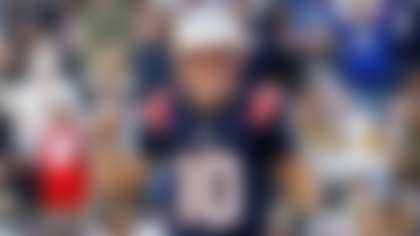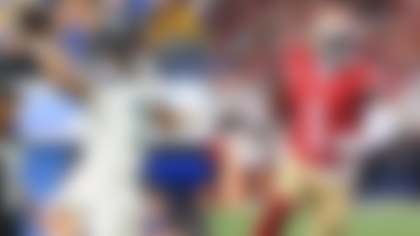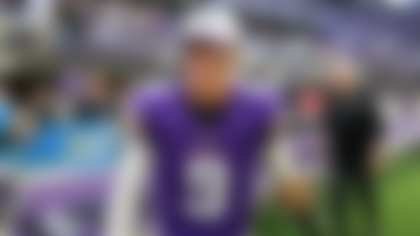Ryan Grigson became the Indianapolis Colts' general manager in large part because the previous regime had never given much thought to the backup quarterback position. That's how the Colts wound up frantically turning to Kerry Collins and Curtis Painter when Peyton Manning missed all of the 2011 season, torpedoing a team that had gone to the playoffs the previous nine seasons and costing Jim Caldwell and Bill Polian their jobs and Manning his lifetime appointment as the Colts' quarterback.
So when Grigson got the job in 2012 and the golden draft ticket that would lead to Andrew Luck, he knew exactly what he wanted to get next. A backup who could serve as Luck's "corner man," someone the rookie could lean on, but who was also a veteran with a lot of games on his résumé who could win if Luck ever went down.
"If you don't have a backup quarterback that can do it, you basically just gave up your season," Grigson explained last season.
Many of Grigson's moves -- or lack thereof -- invite scrutiny one month into the 2015 season, with the Colts' offensive line struggling to protect Luck or open holes for a running game (guard Todd Herremans, the Colts' only notable offseason addition to a troubled offensive line, went from starter to backup to inactive in two weeks) and the defense struggling to hold off opposing offenses. But by 2013, Grigson had zeroed in on Matt Hasselbeck -- who had started a Super Bowl for Seattle, and backed up another superstar in Brett Favre -- to hold the position that Joe Gibbs once said was the second-most important on the team.
And on Sunday, it turned out to be a potential season-saver. With Luck sidelined by an injured shoulder, the 40-year-old who hadn't started since 2012 in Tennessee staved off disaster, leading the Colts to a 16-13 overtime victory that was secured only after the Jacksonville Jaguars missed two game-winning field-goal attempts, one at the end of regulation, one during overtime. Hasselbeck was not brilliant -- he was 30 of 47 for 282 yards and a touchdown -- but he did not have a turnover, and he was steady while the running game struggled to gain traction until a critical Frank Gore run set up the winning field goal.
During Hasselbeck's postgame press conference, coach Chuck Pagano peeked in the room.
"Love you," Pagano said. "So glad you're a Colt."
Luck's inability to play came as a surprise, because Pagano had expressed tremendous confidence Luck would be able to go against Jacksonville. And with the Colts playing Thursday against the reeling Houston Texans, it is unclear if Luck will be available on such a short week, though NFL Media Insider Ian Rapoport did report that the team expects Luck to be ready. Regardless, Hasselbeck did what the Cowboys' Brandon Weeden, Steelers' Michael Vick, Saints' Luke McCown and Bears' Jimmy Clausen hadn't been able to do when they were called on to replace their respective teams' franchise quarterbacks this season: win his first start.
This has been a brutal first month of the season for star quarterbacks. Already, 39 quarterbacks have started, and some of the biggest names in the game -- Tony Romo, Ben Roethlisberger, Drew Brees and Jay Cutler -- have missed starts. Now there is Luck, who missed a game for the first time in his NFL career, further imperiling what already has been a shaky first quarter of the season that has exposed all the Colts' weaknesses.
It has been a baffling year already for Indianapolis, with the relationship between Grigson and Pagano giving rise to expectations Pagano could be fired if the Colts do not go to the Super Bowl this year. It is a situation that mystifies even other people around the league. Why is Pagano the only one on thin ice after taking the Colts one step further in the playoffs in each of his three seasons? Why does it seem as if owner Jim Irsay is reluctant to apportion any of the blame for the team's perceived failures to Grigson? But most of all, it has shone an especially harsh light on the Colts' early struggles. When Luck turned up with a bad shoulder after getting banged around for the first three weeks this season, the game against the still-rebuilding Jaguars was positioned as a referendum on the rest of the roster Grigson had assembled.
And the rest of the roster didn't entirely pass the test.
Hasselbeck, playing behind that same porous offensive line, was sacked three times, and the Colts rushed for just 60 yards while the Jaguars dominated the line of scrimmage on run plays. Gore had a brutal fumble at the 5-yard line in the fourth quarter. The Colts went three-and-out on three straight drives late in the fourth quarter and early in overtime. And the Colts gave up 431 yards of offense to the Jaguars. Had Jacksonville kicker Jason Myers done his job, the Colts would have lost. Instead, they escaped. Instead, they celebrated a win over a team they probably should have been able to beat much more easily, with or without Luck.
That will not be the expectation in two weeks, when the New England Patriotsbring their ongoing revenge tour to the home stadium of the team that started Deflategate. Given Tom Brady's extraordinary level of play and the Colts' already considerable flaws, it was fair to wonder how much of a game that would have been even before Luck's injury. But if Luck is limited at all, one of the most highly anticipated games of the season -- and a game that, during the summer, seemed a likely rehearsal for the AFC Championship Game -- is likely to be a wipeout.
It looks like the entire season will be a struggle for the Colts. Still, they lead the AFC South, which is exactly where they were expected to be. They have Luck, but it's a different quarterback they can thank for salvaging the first quarter of their season.
Three teams in rough shape after slow starts
The most shockingly disappointing teams in the first quarter: the Texans (1-3 after a blowout loss to the Falcons), the Eagles (1-3) and the Dolphins (1-3). All had significant playoff aspirations -- and at least one has gone back on a critical offseason decision.
The Dolphins had the long flight home from London to contemplate the state of their franchise. On Sunday, they looked both uninspired and unprepared in their loss to the New York Jets -- an indictment of both players and coaches. So the firing of head man Joe Philbin on Monday came as little surprise.
Owner Stephen Ross had stuck with Philbin before -- after the bullying scandal and after consecutive 8-8 seasons, giving him a contract extension this past offseason. In-season coaching changes are rare in the NFL, because there are so few games with which to turn around a season. The fact that Ross was willing to pull the plug on Philbin this early in the campaign speaks to the frustrating nature of the team's lackluster start.
Compared to Miami's performance in the coach's first three seasons on the job, the team has seen noticeable declines in points per game (from 20.7 in the previous three seasons to 16.3 in 2015), points allowed per game (from 21.4 in the previous three seasons to 25.3 in 2015), yards per game (324.8 to 314.8) and yards allowed per game (353.2 to 399.5). With Ryan Tannehill and Ndamukong Suh both signed to lucrative contracts, the seemingly inevitable changes had to come on the sideline rather than in the locker room.
What do the Dolphins do with the position going forward? Ross has indicated a penchant for big-name coaches before. He infamously flew off to try to woo Jim Harbaugh -- despite Tony Sparano still being employed. But he also created an odd management structure by installing top front-office executives who did not have a hand in hiring Philbin and, at least in the case of Mike Tannenbaum, might be expected to stick around. That could make luring a top coaching candidate more difficult.
The Texans have a mess of a quarterback situation, after Bill O'Brien chose Brian Hoyer to start the season, benched him in the fourth quarter of the season opener for Ryan Mallett and then brought Hoyer in to replace Mallett in the third quarter Sunday. Hoyer did move the ball, although by that time, the game was well out of reach. O'Brien said on Monday that Mallett will remain the starter for Thursday night's game against the Colts. Overall, J.J. Watt chose to describe the Texans' effort on Sunday pretty simply: "We played absolutely pitiful football today."
Chip Kelly's massive makeover of the Eagles has been a bust so far, with quarterback Sam Bradford looking skittish for long stretches before finally throwing downfield Sunday. And now the frustration is starting to leak out. DeMarco Murray, the running back Kelly hand-selected after he sent LeSean McCoy packing via trade, said after Sunday's loss to Washington that he is not touching the ball often enough, after carrying it just eight times for 36 yards.
"I don't think I am," Murray told Eagles reporters. "But it's the plays that are being called. I love this offense. I love playing with these guys. It's just how it is."
Kickers off their game
Just before the season began, the best kicker in NFL history portended what was to come.
"We've always talked about making kicking and punting less important than it is," Colts kicker Adam Vinatieri said. "If anything, this makes us more important."
Even Vinatieri could not have envisioned the chaos that was to unfold after the NFL made the extra-point kick a 33-yarder, apparently causing the wheels to come off for kickers even on field goals.
Through Sunday's games, kickers had already missed more extra points (17 of 300 attempts) than they did in all of 2014 (eight). Over the last five seasons, kickers had made 99.4 percent of extra-point kicks. Through Sunday, the rate has dropped to 94.3 percent. If it continues until the end of the season, it would be the lowest rate since 1982 (93.8 percent) -- and the bad weather hasn't even started.
But kickers pulled, doinked and hooked like we've rarely seen this week. Josh Scobee missed two field-goal attempts for Pittsburgh on Thursday night and was out of a job shortly thereafter. On Sunday, Jacksonville's Jason Myers missed two field-goal tries -- a 53-yarder that would have won the game in regulation and a 48-yarder that would have won it in overtime. Buffalo's Dan Carpenter missed a 30-yard field-goal attempt, and the Giants' Josh Brown missed an extra point. Tampa Bay's Kyle Brindza missed two field-goal attempts -- and was released Monday. The Eagles' Caleb Sturgis, in his debut for the team, missed an extra point and a field-goal try.
In all, teams missed 14 field-goal attempts and four extra points in Week 4 through Sunday night's game. That's the second most in a week since 2010. League-wide, kickers are 198 of 237 on field-goal attempts this season (83.5 percent). If that pace continues, it would be the lowest field-goal percentage since 2011 (82.9 percent) -- and, again, these are the good-weather weeks.
What has happened? Jay Feely, who kicked for 14 seasons in the NFL, believes it all goes back to the longer extra point.
"Extra points used to be in-game practice," Feely texted Sunday afternoon. "You didn't have to worry about the result; [it was a given] which allowed you to focus on your form and get grooved in during the game. Somewhat of a confidence builder. Like throwing a couple screens early for a quarterback. Now, the pressure is bigger for extra points than even field goals because there is zero room for error [100 percent success is demanded]. The pressure intensifies and it impacts field-goal performance, as well."
Of course, the notion that an extra-point kick was so automatic that kickers didn't have to think about it underscores the reason the league wanted to change it. And league officials have certainly accomplished their goal of making the extra point a more competitive play, but the unintended consequences might alter games far more than the extra points do.
Follow Judy Battista on Twitter @judybattista.












